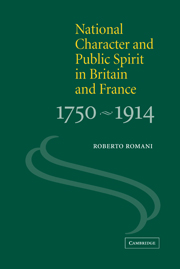9 - Socializing public spirit, 1870–1914
Published online by Cambridge University Press: 22 September 2009
Summary
Tales of everyday life
To be real, civic qualities must inform common behaviour; this is why small things have the potential to reveal basic attitudes. Not infrequently, certain minor mores seem to set the tone of communal life. Observers perceive that, say, the apparent unwillingness of some peoples to queue is deep-rooted – with some reason, one might trace it back to habits of distrust of authority and amoral self-advancement formed through centuries – and that it tells a truth about those peoples. Mores of this kind may be directly observed or experienced by writers, a circumstance which alone accounts for much of their impact. This chapter begins with a sample of (allegedly) meaningful occurrences, brief stories whose common rationale will be made clear later on.
There was a certain hospital in which the custodians used to take home with them the food of the patients and even the sheets of the dying, recounted the Italian historian Pasquale Villari. The ‘secret poison’ of Italian society, he explained, is the conviction that even under a free government doing one's own duty is not the principal means to get ahead. The aftermath of the Risorgimento has witnessed ‘the triumph of the incompetent’ and the corruption of politics under the aegis, customary in Italy, of a ‘double norm’ for public and private life.
- Type
- Chapter
- Information
- Publisher: Cambridge University PressPrint publication year: 2001

